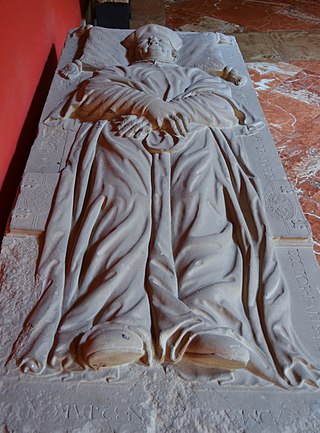
William of Ockham or Occam was an English Franciscan friar, scholastic philosopher, apologist, and Catholic theologian, who is believed to have been born in Ockham, a small village in Surrey. He is considered to be one of the major figures of medieval thought and was at the centre of the major intellectual and political controversies of the 14th century. He is commonly known for Occam's razor, the methodological principle that bears his name, and also produced significant works on logic, physics and theology. William is remembered in the Church of England with a commemoration on the 10th of April.

GiacomoZabarella was an Italian Aristotelian philosopher and logician.

Paul of Venice was a Catholic philosopher, theologian, logician and metaphysician of the Order of Saint Augustine.
Francis of Meyronnes was a French scholastic philosopher. He was a distinguished pupil of Duns Scotus, whose teaching (Scotism) he usually followed.

Pelbartus Ladislaus de Temesvár was a Franciscan writer and preacher.
The first decade of the 16th century marked the creation of some significant compositions. These were to become some of the most famous compositions of the century.
The Soncino family is an Italian Ashkenazi Jewish family of printers, deriving its name from the town of Soncino in the duchy of Milan. It traces its descent through a Moses of Fürth, who is mentioned in 1455, back to a certain Moses of Speyer, of the middle of the fourteenth century. The first of the family engaged in printing was Israel Nathan b. Samuel, the father of Joshua Moses and the grandfather of Gershon. He set up his Hebrew printing-press in Soncino in the year 1483, and published his first work, the tractate Berakot, Dec. 19, 1483. The press was moved about considerably during its existence. It can be traced at Soncino in 1483-86; Casalmaggiore, 1486; Soncino again, 1488–90; Naples, 1490–92; Brescia, 1491–1494; Barco, 1494–97; Fano, 1503-6; Pesaro, 1507–20 ; Rimini, 1521-26. Members of the family were at Constantinople between 1530 and 1533, and had a branch establishment at Salonica in 1532-33. Their printers' mark was a tower.

Aodh Mac Cathmhaoil, O.F.M., was an Irish Franciscan theologian and Archbishop of Armagh. He was known by Irish speakers at Leuven (Louvain) by the honorary name Aodh Mac Aingil, and it was under this title that he published the Irish work Scáthán Shacramuinte na hAthridhe.

Philip Faber (Fabri) was an Italian Franciscan theologian, philosopher and noted commentator on Duns Scotus.
Lambertus de Monte, also Lambertus de Monte Domini or Lambert of Cologne, was a medieval scholastic and Thomist.
Jan of Stobnica, was a Polish philosopher, scientist and geographer of the early 16th century.
Martin Morin was a French printer of incunables, active in Rouen between about 1490 and 1518. It has been suggested that he was born in or near Orbec around 1450, and died in Rouen around 1522. He learned the trade in the Rhine region where he was sent by the Rouen family Lallemant together with Pierre Maufer, and then became a printer and bookseller in Rouen. His 1492 Breviarium Saresberiense or Breviarium Sarum, a breviary for Salisbury, is said to be "the first recorded liturgical book printed for the English market".

Guido de Monte Rochen or Guy de Montrocher was a French priest and jurist who was active around 1331. He is best known as the author of Manipulus curatorum, a handbook for parish priests, that was often copied, with some 180 complete or partial manuscripts surviving, and later reprinted throughout Europe in the next 200 years, with at least 119 printings, and sales which have been estimated to be three times those of Thomas Aquinas' Summa Theologica. It became obsolete only when the Council of Trent created the Roman Catechism in 1566.

Juan de Celaya was a Spanish mathematician, physicist, cosmologist, philosopher and theologian. He was a member of the so-called Calculators, using ideas from Merton College. He is known for his work on motion and in logic.

Androw Myllar was the first Scottish printer.

John Duns Scotus was a Scottish Catholic priest and Franciscan friar, university professor, philosopher and theologian. He is one of the four most important Christian philosopher-theologians of Western Europe in the High Middle Ages, together with Thomas Aquinas, Bonaventure and William of Ockham.
The Master of Robert Gaguin was an anonymous painter, active in Paris around 1485–1500. He was so named by Nicole Reynaud after a manuscript of Robert Gaguin's translation of Julius Caesar's De Bello Gallico, offered by the translator to Charles VIII, king of France. He belongs to a circle of French artists, whose art follows the style of the Master François.
Berthold Rembolt was a medieval printer.
Ireneo Brasavola was an Italian theologian and bishop of Castro, Lazio, from 1617 to his death.
John Foxal, also spelled Foxholes, Foxhalls, Foxhals or Foxall, was an English Franciscan theologian, philosopher and prelate who served as the archbishop of Armagh and primate of Ireland from 1471 until his death. An Oxford University graduate, he lectured in Germany and Italy before returning to the Isles as a bishop.










